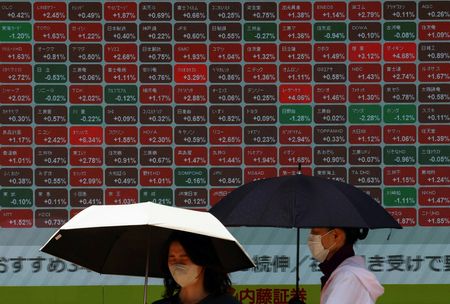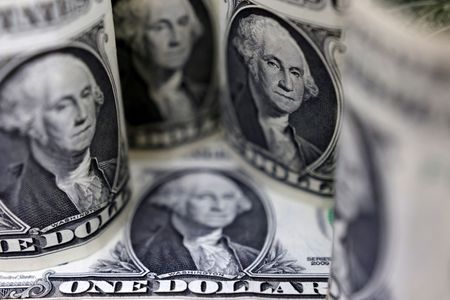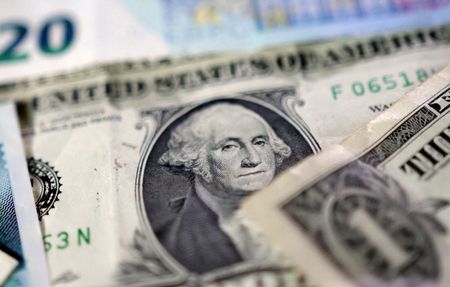By Stephen Culp
NEW YORK (Reuters) -U.S. stocks pulled a late-session rebound on Wednesday and oil prices logged their biggest monthly drop in 3-1/2 years as investors parsed news of the first U.S. economic contraction since 2022.
All three major U.S. stock indexes recovered from a sharp selloff earlier in the day, with the S&P 500 and the Dow flipping positive just minutes ahead of the closing bell.
The tech-laden Nasdaq ended modestly lower.
The S&P 500 and the Dow lost ground in April, while the Nasdaq posted a small monthly gain.
“The market’s action … is reflective of an economy that’s probably going to be struggling as the year progresses,” said Chuck Carlson, CEO of Horizon Investment Services in Hammond, Indiana.
U.S. gross domestic product contracted in the first quarter, largely due to a surge in imports to avoid expected tariffs. U.S. President Donald Trump blamed his Democratic predecessor Joe Biden, and said his tariffs would eventually bring a booming economy.
The reversal “may be a result of people digesting some of these numbers and trying to put them into context,” Carlson added.
“Was it that bad? Are we on the precipice of a recession? Markets are trying to evaluate that and put into some context,” Carlson said.
The ongoing, multi-front trade war continues to cloud U.S. corporate earnings season, with companies increasingly pulling or reducing guidance due to tariff uncertainties.
Wall Street pared losses after the release of more upbeat economic indicators. The Personal Consumption Expenditures (PCE) price index was unchanged on a monthly basis and consumer spending was stronger than expected.
Of the “Magnificent Seven” group of artificial intelligence-related megacap companies, Meta Platforms and Microsoft are expected to post results after the bell.
The Dow Jones Industrial Average rose 141.74 points, or 0.35%, to 40,669.36, the S&P 500 rose 8.23 points, or 0.15%, to 5,569.06 and the Nasdaq Composite fell 14.98 points, or 0.09%, to 17,446.34.
European stocks ended a choppy session higher as investors mulled key data and corporate earnings. But the STOXX 600 registered a second consecutive monthly loss due to tariff-related uncertainties.
MSCI’s gauge of stocks across the globe rose 1.56 points, or 0.19%, to 832.90.
The pan-European STOXX 600 index rose 0.46%, while Europe’s broad FTSEurofirst 300 index rose 9.45 points, or 0.45%.
Emerging market stocks rose 5.67 points, or 0.51%, to 1,111.67. MSCI’s broadest index of Asia-Pacific shares outside Japan closed higher by 0.88%, to 580.65, while Japan’s Nikkei rose 205.39 points, or 0.57%, to 36,045.38.
The dollar held its gains after a swath of mixed U.S. economic data and as trade tensions eased.
The dollar index, which measures the greenback against a basket of currencies including the yen and the euro, rose 0.51% to 99.68, with the euro down 0.58% at $1.132.
Against the Japanese yen, the dollar strengthened 0.52% to 143.08.
Sterling weakened 0.63% to $1.3322.
The Mexican peso weakened 0.32% versus the dollar at 19.616.
The Canadian dollar strengthened 0.33% versus the greenback to C$1.38 per dollar.
Benchmark U.S. Treasury yields seesawed to a lower close amid choppy trading. They inched 2 basis points lower to 4.156%, from 4.174% late on Tuesday.
The 30-year bond yield rose 2.5 basis points to 4.6734% from 4.648% late on Tuesday.
The 2-year note yield, which typically moves in step with interest rate expectations for the Federal Reserve, fell 5.3 basis points to 3.605%, from 3.658% late on Tuesday.
Oil prices plunged further, logging their largest monthly drop in nearly 3-1/2 years as Trump’s trade war eroded the demand outlook.
U.S. crude fell 3.66% to settle at $58.21 per barrel, while Brent settled at $63.12 per barrel, down 1.76% on the day.
Gold prices dipped in opposition to the dollar.
Spot gold fell 0.65% to $3,294.59 an ounce. U.S. gold futures fell 0.72% to $3,295.00 an ounce.
(Reporting by Stephen Culp; Additional reporting by Alun John; additional reporting by Rae Wee in Singapore; Editing by David Gregorio, Will Dunham and Richard Chang)










